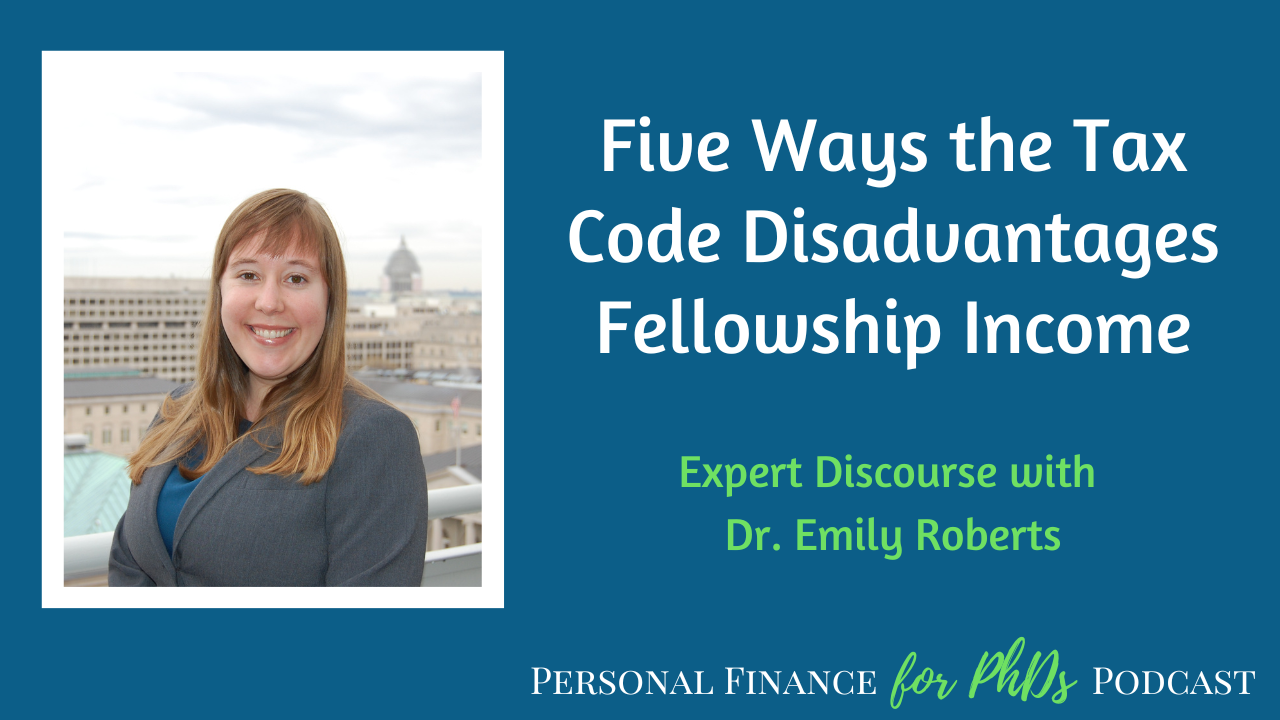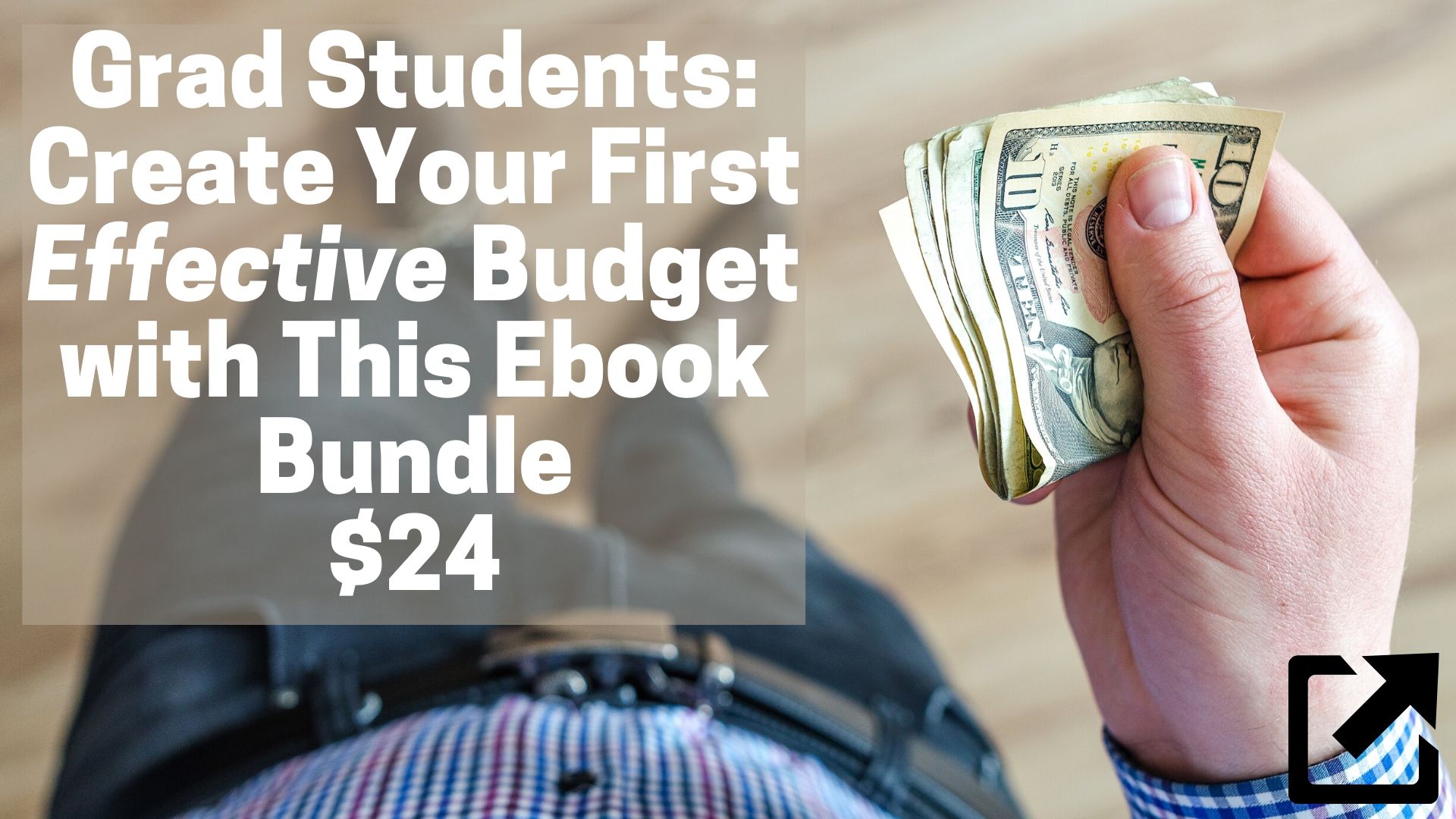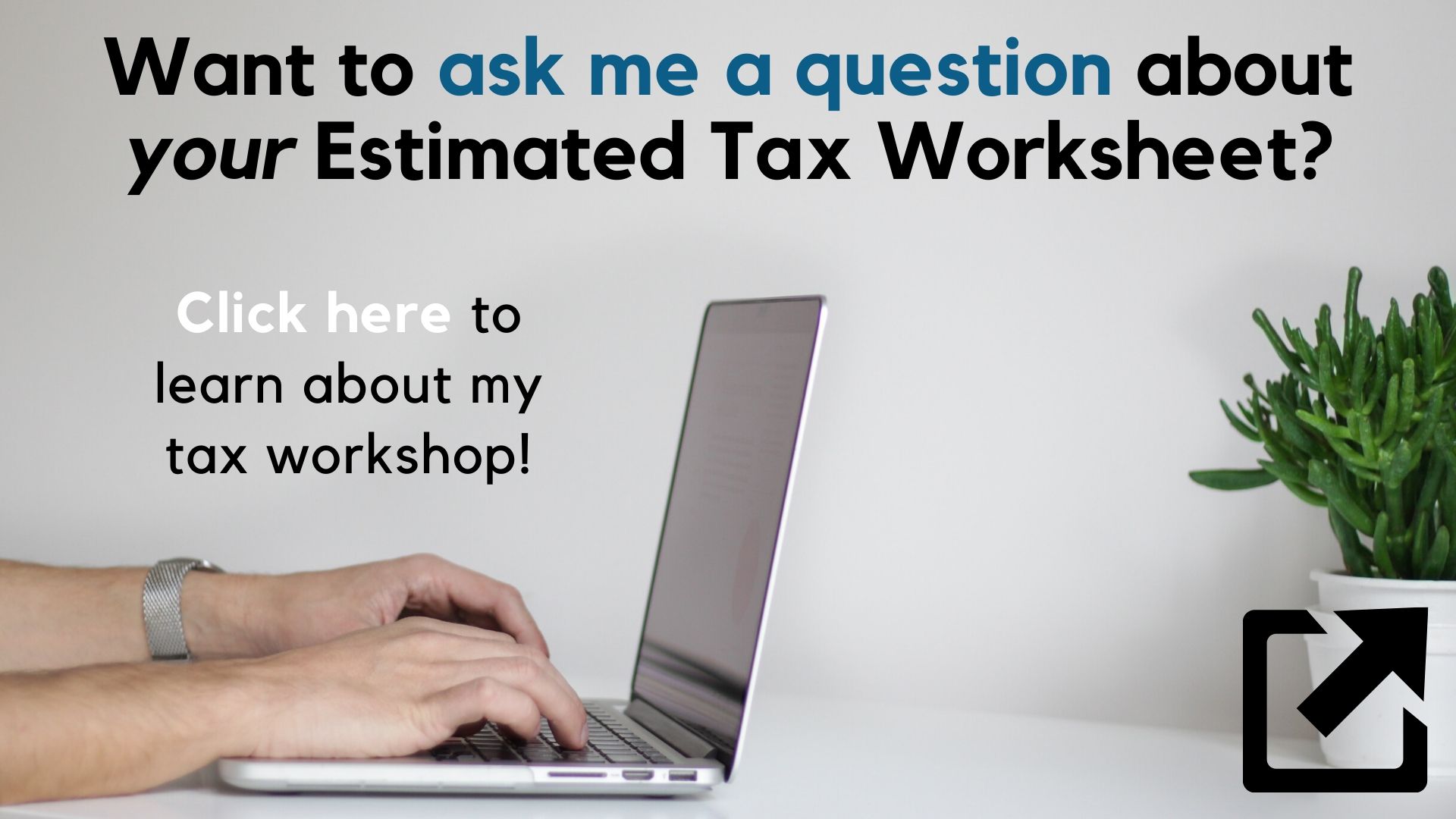In this episode, Emily details five ways the federal income tax code disadvantages fellowship income, sometimes resulting in a higher tax rate and sometimes just causing a bit of a headache for fellows. Additionally, she covers two ways that the tax code advantages fellowship income and one more difference that has both pluses and minuses. This episode is for current fellows and future fellows as advance tax planning and action can mitigate some of these negative effects. At the end of the episode, Emily also shares how you can advocate for change at the federal level.
Links Mentioned in this Episode
- Home-buying AMA with Same Hogan register here
- PF for PhDs Tax Workshops
- PF for PhDs Tax Center
- PF for PhDs Subscribe to Mailing List (Access Advice Document)
- PF for PhDs Podcast Hub (Show Notes)

Intro
Welcome to the Personal Finance for PhDs Podcast: A Higher Education in Personal Finance.
I’m your host, Dr. Emily Roberts, a financial educator specializing in early-career PhDs and founder of Personal Finance for PhDs.
This podcast is for PhDs and PhDs-to-be who want to explore the hidden curriculum of finances to learn the best practices for money management, career advancement, and advocacy for yourself and others.
This is Season 14, Episode 1, and today is a solo episode for me on fellowships and federal income tax. Specifically, I am going to detail for you five ways the tax code disadvantages fellowship income, sometimes resulting in a higher tax rate and sometimes just causing a bit of a headache for fellows. Additionally, I’ll cover two ways that the tax code advantages fellowship income and one more difference that has both pluses and minuses. Keep listening to this episode if you are currently on fellowship or expect to be in the future. Advance tax planning and action can mitigate some of these negative effects. I will also tell you at the end of the episode how you can advocate for change at the federal level.
Speaking of the disadvantages of fellowship income, it’s unfortunately quite common for fellows to have a tough time getting a mortgage. Sometimes they will be preliminarily approved based on their income numbers alone, but once under contract on a home they are dropped by their lender because of their income type and documentation! However, there is one lender who works with PhDs and particularly fellows very regularly.
Sam Hogan is a mortgage originator specializing in grad students and PhDs, an advertiser with Personal Finance for PhDs, and my brother. Years ago, I told him about the issue I just outlined, and he set to work figuring out how to use fellowship income to qualify for a mortgage. While I won’t say it’s as straightforward as using W-2 income, Sam has a great success rate in presenting grad students and PhDs to the underwriters working with his employer, Movement Mortgage, and getting them approved for mortgages. Sam can readily tell you if your fellowship income is likely to be approved or not based on the specifics of your circumstances, and if not what options you still have.
I am hosting an Ask Me Anything with Sam today, Monday, January 9, 2023 at 5:30 PM PT. Come with any question you like about the home-buying process and we will do our best to help you. You can register for the AMA at PFforPhDs.com/mortgage/.
If you’re listening to this later on, you can still check that link for the next AMA date as we hold them periodically, or you can contact Sam directly at 540-478-5803 or [email protected] to discuss your situation.
I wish you all success with your homebuying aspirations in 2023 and following!
You can find the show notes for this episode at PFforPhDs.com/s14e1/.
Disclaimers
Disclaimer #1: This episode is going into production in early January 2023. I rely on IRS forms, instructions, and publications for this material, and at the time of this recording most of these documents have been updated for tax year 2022, but not all of them. In those cases I’m going off the 2021 material. If any content in this episode turns out to be inaccurate for tax year 2022, I will update the show notes page with the corrections, so I suggest visiting PFforPhDs.com/s14e1/ before relying on any of the information. For tax year 2023 and later, please visit PFforPhDs.com/tax/ for my most updated tax content.
Disclaimer #2: The target audience for this episode is postbacs, graduate students, and postdocs at US universities and institutes who are US citizens, permanent residents, or residents for tax purposes. Unless otherwise specified, when I say tax I mean federal income tax.
Disclaimer #3: The content in this episode is for educational purposes only and should not be considered advice for tax, legal, or financial purposes for any individual.
Without further ado, here’s my solo episode on how the tax code disadvantages fellowship income.
Motivation
You might be surprised by the topic of this episode, because striving to obtain funding via a fellowship is a super common if not universal practice in academia. Fellowships are seen as a superior form of funding because of their prestige and that they normally excuse the recipient from teaching responsibilities or similar. In many cases, winning a fellowship results in a raise as well.
I’m not making any kind of argument in this episode that you should stop applying for fellowships or reject a fellowship that you’ve won—doubly so if you will be making more money with the fellowship than without it.
What I am doing is:
- Pointing out the tax issues and pitfalls that can or might come with fellowship income. There are certain groups of people who are at risk of actually paying more in income tax with a fellowship, which are people under age 24, parents, and non-students. Even if you don’t end up paying more in income tax, there are certain complexities of fellowship income that you can prepare for or even avoid if you know about them. This is to help you with taking personal responsibility for your tax situation.
- Suggesting changes to the tax code that would resolve these disadvantages. This is to help our community know in what ways advocacy for our workforce is needed.
Outline
Here’s where we’re going with this episode. I’m going to define some terms and tell you what I am comparing the tax treatment of fellowship income to when I say that it is disadvantaged by the tax code. I have five points to cover on how the tax code disadvantages fellowship income. The first couple points apply to most fellows but don’t result in a higher tax rate when handled properly. The next couple of points are about when having fellowship income actually results in paying more income tax. The final point is about a tax benefit that is not available to fellows. Then we’re going to switch gears and discuss two ways the tax code advantages fellowship income and one difference that I see as having both pros and cons.
By the way, I am trying to keep this episode focused on how the tax code disadvantages and advantages fellowship income. I could do an entire other episode, and perhaps I will, on the ways universities disadvantage and advantage fellowship recipients through their policies. But for today, we’re sticking with the topic of the federal income tax code.
Terms
I have to establish some definitions of terms here at the start. The subject of this episode is fellowships, but academia doesn’t necessarily use that term exactly the same way the IRS does. Therefore, I have created my own framework to explain the two types of higher education income.
The most common way the word fellowship is used in academia is to describe an amount of money that is awarded to an individual, as IRS Publication 970 states, “to aid in the pursuit of study or research.” Usually these are awarded for merit via a competitive process, such as a unique application for a specific fellowship program or your application to a postbac, graduate, or postdoc program. I call this income ‘awarded income’ in my framework.
The other type of income in my framework is ‘employee income.’ This is payment for services such as teaching or research, and the postbac, grad student, or postdoc is an employee of the university or institute. Employee income is reported on a Form W-2 at tax time. It’s unusual for programs to use the word fellowship to describe employee income, but it does happen occasionally.
For the purposes of this episode, we are only discussing awarded income, which is to say fellowship income that is not reported on a Form W-2. I will continue to use the word fellowship throughout the episode, but please understand that we’re only discussing that particular variation of the term, which is the most common in academia. If you’re unsure whether your fellowship is awarded income or employee income, reference the type of tax form or forms you receive during tax season. More on that in a moment.
Income Tax Basics
Another point I need to get out of the way at the start here is to clarify that fellowship income is subject to income tax. There are nuances and special scenarios that we’ll get into later in the episode, but very generally speaking, your stipend or salary is going to be taxed at the same rate whether it is awarded income or employee income.
When I speak about fellowship income being disadvantaged by the tax code, what I am pointing out are the ways that fellowship income ends up being treated differently or ultimately taxed at a higher rate than how employee income is treated and taxed. Conversely, in some ways fellowship income has an advantage, and again that is relative to employee income.
If you’ve heard that fellowship income is tax-free, that is either a false rumor, a misunderstanding, or a statement that requires a lot more caveats. Fellowship income used to be exempt from income tax, but that changed with the Tax Reform Act of 1986. I’ll tell you more about why these rumors and such persist throughout this episode, but for now just know that you should expect to pay income tax on your stipend or salary, unless your gross income for the year is quite low or you can take lots of deductions and/or credits. That is true whether your stipend or salary comes from a fellowship or an employee position. You can learn more about that in Season 2 Bonus Episode 1 of this podcast, which you can find at PFforPhDs.com/s2be1/.
Now we’ll get into the meat of this episode: my list of five tax-related disadvantages of receiving fellowship income, two advantages, and 1 neutral difference.
Disadvantages
Disadvantage #1: There is no single correct way that fellowship income is required to be reported to the postbac, grad student, or postdoc recipient. This is in contrast to employee income, which must be reported on a Form W-2.
Because there is no single correct way to report fellowship income, universities, institutes, and funding agencies take a variety of approaches. The most common form issued is a Form 1098-T, but sometimes Form 1099 is used, such as Form 1099-MISC, Form 1099-NEC, or Form 1099-G. Sometimes a courtesy letter is sent in lieu of an official tax form. Many organizations choose to not communicate at all with the fellowship recipient. When fellowship income goes unreported entirely, it contributes to the rumor mill that it is not taxable income.
These approaches can mislead fellows into not reporting their income, resulting in underpayment of tax, or misreporting it, which often results in overpayment of tax.
To put fellowship income on even footing with employee income, the IRS could require that a tax form be used to report fellowship income, whether one that currently exists or a new or adjusted one. This would greatly reduce the confusion among taxpayers and tax preparers about whether and how to account for this income on tax returns.
Disadvantage #2: The issuers of fellowships are not required to withhold income tax on behalf of the recipients, and they almost never take the responsibility to do so.
Employers virtually always withhold income tax on behalf of their employees. This is the situation that most Americans experience and are familiar with. Your employer sends in income tax payments on your behalf throughout the year, and then after you file your tax return, you receive a refund or owe some additional tax.
However, for fellowship income, the issuing organizations have no such withholding requirement. With very few exceptions, they leave paying income tax entirely up to the fellowship recipient, which is typically a very unfamiliar arrangement.
This lack of withholding also contributes to the rumors that fellowship income is not subject to income tax. I have even seen university administrators label fellowship income “tax-free.” What they mean is that it is not subject to income tax withholding; they are speaking from their own perspective. But when a fellow sees that label, they read it from their own perspective, and it is highly misleading.
By default, the IRS expects to receive income tax payments throughout the year. In the absence of employer withholding, the taxpayer is supposed to make quarterly payments through the estimated tax system, unless an exception applies to them.
This typically goes one of two ways: 1) The fellow learns about the estimated tax requirement close to the start of their fellowship, sets aside money for their future tax payments as their paychecks come in, and makes their estimated tax payments if required. This is the ideal and something I am constantly beating a drum about. 2) The fellow does not realize that they are responsible for their own income tax payments until they are hit with a large tax bill and possibly a penalty upon filing their tax return. This is at minimum extraordinarily unpleasant and in some cases dangerous to the financial, physical, or mental well-being of the fellow. I further discuss this scenario of a large, unexpected tax bill in the videos titled “Why Is My Fellowship Tax Bill So High?!” and “What to Do When Facing a Huge Fellowship Tax Bill,” which you can find on my YouTube channel, Personal Finance for PhDs.
A rare few universities and institutes do offer income tax withholding on fellowship income. My alma mater, Duke University, did so when I was a graduate student there. This relieves the fellow from calculating and making estimated tax payments and prevents large, unexpected tax bills.
To put fellowship income on even footing with employee income, the IRS could require that universities and institutes at least offer income tax withholding on fellowship income. To go along with the previous disadvantage, a specifically designed fellowship reporting form could explicitly list federal, state, and local income tax withheld.
Until such reform comes about, I recommend that fellows take my workshop, Quarterly Estimated Tax for Fellowship Recipients, which you can find linked from PFforPhDs.com/tax/.
Disadvantage #3 and this is the big one: Fellowship income is not usually considered “earned income,” and without that designation many postbacs, grad students, and postdocs pay more in income tax than they would if it were considered earned income.
The term “earned income” is actually used all over the tax code and publications, and you have to be really careful because its definition can change depending on which benefit is being discussed. For example, for the purpose of calculating the standard deduction, taxable fellowship income is included in the definition of earned income. But for the Kiddie Tax, the Earned Income Tax Credit, and the Child and Dependent Care Tax Credit, fellowship income is not considered earned income.
Let’s discuss each of these scenarios briefly in turn.
- The Kiddie Tax, which is a colloquial name, is when the unearned income, above a certain threshold, of a person under age 24 is taxed at their parents’ marginal tax rate. There’s a whole history behind the Kiddie Tax that I won’t go into now, but you can read my article about it linked from PFforPhDs.com/tax/. What is both perplexing and infuriating to me is that fellowship income is included in the definition of unearned income. So if you are a student under age 24 on fellowship, even if you are not claimed as a dependent on your parents’ tax return, you could be hit with the Kiddie Tax. I’m not saying you definitely will because there are calculations that go into this, but it can happen. If it does, your income is taxed at your parents’ marginal tax rate. If your parents have a low to moderate adjusted gross income, the Kiddie Tax either won’t apply or won’t increase your tax liability by much. But if your parents’ top marginal tax bracket is 22% or higher, your tax liability will be much higher than it would have been without the Kiddie Tax. And, again, it does not matter if you’re financially independent from your parents, this tax can still apply. Ugh!
- The Earned Income Tax Credit is a super valuable credit for people who are low-income, especially if they have children. For example, if you are single with one child and qualify for the credit, you’ll receive a benefit from the Earned Income Tax Credit if your income is below $43,492 in 2022. The lower your income is under that threshold, the more of the benefit you’ll receive, up to a maximum of, again for example, $3,733 for one child in 2022. This credit is refundable, which means that if it wipes out your entire tax liability, the IRS can end up paying you money. Again, just an incredibly valuable credit for low-income individuals and families, which you know many postbacs, grad students, and postdocs would be considered. However, as the name implies, your household has to have earned income during the calendar year to qualify, and fellowship income isn’t earned income. I will never forget a heartbreaking comment I received on my website years ago from a grad student who was married with two children and supporting the entire household on his grad student stipend. He was devastated when his tax return showed that because he switched onto fellowship and didn’t have any earned income for a calendar year, that his family lost out on thousands of dollars of a benefit they had received in prior years when he had employee grad student income. Can you imagine? Why would the IRS, Congress, we the people, exclude vulnerable families like that one from this benefit?
- The Child and Dependent Care Tax Credit is a tax credit that helps parents, among others, pay for daycare, preschool, after school care, etc. so that they can work or look for work. The benefit inversely scales with your income, like the Earned Income Tax Credit, but for example if you had one child in care and your income was low enough that you received the maximum benefit, this credit would reduce your tax liability by $1,050 in 2022. Pretty good benefit. However, here’s that catch again, you and your spouse if you’re married must both have earned income to qualify. There is an exception for students, so grad students will still qualify for the credit for all the months in which they are students, but postbacs and postdocs won’t. This issue was brought to my attention by a married couple with a baby, both postdocs on fellowship, who were taken aback that they weren’t able to claim this credit. And why? Does being on fellowship mean that they don’t need childcare? Or do they not deserve a similar carve-out to the one that students get?
I have to stop here because I’m getting really worked up about these issues. Pretty simple change here, IRS. Include fellowship income in the definitions of earned income everywhere. Or make exceptions for fellowship income in all of the above benefits and any other relevant ones.
I haven’t even covered how fellowship income relates to the definition of “support” for determining if someone is a dependent or subject to the Kiddie Tax, and I won’t take the time to illustrate it now. It’s a similar problem that the IRS could solve by saying that fellowship income counts as support… anyway. See my tax return workshops for further discussions of that rat’s nest. Let’s move on.
Commercial
Emily here for a brief interlude!
Tax season is about to start heating up, and the best place to go for information tailored to you as a grad student, postdoc, or postbac is PFforPhDs.com/tax/. From that page I have linked to all of my tax resources, many of which I have updated for tax year 2022.
On that page you will find free podcast episodes, videos, and articles on all kinds of tax topics relevant to PhDs. There are also opportunities to join the Personal Finance for PhDs mailing list to receive PDF summaries and spreadsheets that you can work with.
The absolute most comprehensive and highest quality resources, however, are my asynchronous tax workshops. I’m offering three tax return preparation workshops for tax year 2022, one for grad students who are US citizens or residents, one for postdocs who are US citizens or residents, and one for grad students and postdocs who are nonresidents. Those tax return preparation workshops are in addition to my estimated tax workshop for grad student, postdoc, and postbac fellows who are US citizens or residents.
My preferred method for enrolling you in one of these workshops is to find a sponsor at your university or institute. Typically that sponsor is a graduate school, graduate student association, postdoc office, postdoc association, or an individual school or department. I would very much appreciate you recommending one or more of these workshops to a potential sponsor. If that doesn’t work out, I do sell these workshops to individuals, but I think it’s always worth trying to get it into your hands for free or a subsidized cost.
Again, you can find all of these free and paid resources, including a page you can send to a potential workshop sponsor, linked from PFforPhDs.com/tax/.
Now back to my expert discourse.
Disadvantages Continued
Disadvantage #4: There is no mechanism for making fellowship money that pays your health insurance premium tax-free unless you are a student.
This disadvantage requires a bit of background.
Think of a regular employment situation, not related to academia. Unfortunately in the US, health insurance is tightly tied to your employer partly because of a tax benefit afforded to them. When your employer provides your health insurance plan, the cost of the premium is tax-deductible for both you and the employer. That means that you don’t pay income tax on the portion of your income that goes toward that particular purpose. It’s as if you earned less money than you actually did. This is accounted for automatically for you on your Form W-2. The income listed in Box 1 is your gross income less your pre-tax payroll deductions such as your health insurance premium. Easy peasy. If you’re self-employed, there is also a mechanism to deduct your health insurance premium.
But if you’re not employed or self-employed, the only way you can perhaps deduct your health insurance premiums is if you itemize your deductions. Even in that case you can only deduct the portion of your medical expenses that exceeds 7.5% of your adjusted gross income. If you are a relatively healthy single person who wouldn’t otherwise itemize your deductions, I doubt itemizing will help you overall. Most people in this situation effectively cannot deduct their health insurance premiums or at best can only deduct a portion of them.
I need to back up now and talk about the situation with health insurance provided by universities. If you receive your health insurance through your parents, the following is not relevant to you. If you’re an employee of the university and receive health insurance because of that status, that’s a normal straightforward deduction as I just discussed. Let’s set that aside and discuss what happens when fellowship or scholarship income pays your health insurance premium, either automatically before you receive your paycheck or out of your own pocket.
If you are a grad student, there is a mechanism to make that fellowship income tax-free. We’re actually going to discuss that in the upcoming section on the tax advantages of fellowship income. However, if you’re a postbac or postdoc, this mechanism isn’t available to you. There is no way that I know of, short of itemizing their deductions, for postbacs and postdocs to make the fellowship money that pays their health insurance premiums tax-free. And that sucks.
This conundrum has been highlighted by many postdocs and postdoc associations. If a university or institute pays postdoc employees and postdoc fellows the same amount, the postdoc fellows effectively receive a pay cut because they have to pay income tax on the portion of their fellowship income that pays their health insurance premiums while postdoc employees do not.
The general solution to this whole issue is universal healthcare, but even without going that far, Congress could change the tax code so that all health insurance premiums are tax-deductible even without having to itemize deductions. I don’t know, maybe that would have disastrous effects somehow. Another way to fix this would be to expand the benefit that students use to non-student trainees as well.
Disadvantage #5: Fellowship recipients cannot contribute to their university or institute’s 403(b) or 457 plans. These are employer-sponsored tax-advantaged retirement accounts, and they are only available to employees.
Similar to the health insurance situation, the tax code has incentivized saving and investing for retirement primarily through employer-sponsored plans. These plans are exclusively offered to employees. That goes for 401(k)s as well as 403(b)s and 457s.
Looking at the situation for postdocs again, it’s typical for postdoc employees to be able to contribute to the university or institute’s 403(b) or 457, albeit usually without a match. However, postdoc fellows do not enjoy this benefit. While the universities administer these plans, again this is a policy issue at the federal level that excludes non-employees. Side note: If you’re wondering why grad student employees don’t usually have access to their university’s 403(b)s or 457s, that is a university-level policy issue as far as I can tell.
Not exactly the same but as a related issue, there is a type of tax-advantaged retirement account that is available to everyone with “taxable compensation,” which is an Individual Retirement Arrangement or IRA. You do not have to be an employee to contribute to an IRA. Up until 2019, the definition of “taxable compensation” excluded fellowship income, but the SECURE Act changed that definition starting in 2020. Taxable fellowship income for graduate students and postdocs is now considered taxable compensation for the purpose of contributing to an IRA. We know from this example that change is possible when it comes to fellowship income and federal tax benefits. You can learn more about this issue in Season 4 Bonus Episode 1 of this podcast, which you can find at PFforPhDs.com/s4be1/.
I think the most accessible solution to this particular disadvantage is actually not to somehow extend the employee-only workplace-based retirement benefit to fellows but rather to increase the contribution limit for IRAs to solve this for everyone. The contribution limits in 2023 for someone under age 50 are $6,500 for an IRA and $22,500 for a 403(b), 457, or 401(k). Why should there be such a big advantage for employees?
Advantages
Alright, it’s time for a dose of positivity. There are two advantages to fellowship income that I have come across.
Advantage #1: Students can make fellowship income tax-free by pairing it with qualified education expenses or QEEs. Basically, if your awarded income paid for a QEE, that amount of awarded income is tax-free. You essentially get to deduct the QEEs from your awarded income before you even report it on your tax return. This federal income tax benefit is found in Publication 970 Chapter 1, and I call it Tax-Free Scholarships and Fellowships or TFSF. Again, this benefit is only available to students.
How does this work differently for grad students with awarded vs. employee income for their stipends? This comes into play when you use your stipend to pay for an education expense rather than having it paid on your behalf via a scholarship or waiver.
Let’s take as a very simple example a grad student who has only two education expenses, tuition and a student health fee. The tuition is paid on their behalf by a scholarship, and they pay the student health fee out of pocket.
The scholarship that pays their tuition is awarded income, but it is made tax-free via TFSF because it pays for tuition, which is a QEE. So that awarded income doesn’t become part of the grad student’s taxable income.
The student health fee is a QEE under TFSF, so if the grad student’s stipend is from a fellowship, the student health fee makes that amount of fellowship income tax-free. It’s like taking a deduction. However, if the grad student’s stipend is employee income, no part of it can be made tax-free by the student health fee. Furthermore, student health fees are not qualified education expenses under the other two available higher education tax benefits, the Lifetime Learning Credit and the American Opportunity Tax Credit. So in this particular example, there is no tax benefit available to a grad student employee for their student health fee, whereas a grad student fellow can use the student health fee to reduce their taxable income.
That was a very simple and contrived scenario, but it turns out that this benefit can be uniquely applied, under specific circumstances, to lots of other common education expenses, such as textbooks, computers, software, and health insurance premiums.
If you are a grad student on fellowship, I highly recommend taking my tax workshop How to Complete Your Grad Student Tax Return (and Understand It, Too!) to understand TFSF and the other higher education tax benefits fully. This goes double if you did pay out of your fellowship stipend for the kinds of education expenses I just mentioned. You will learn under what circumstances you can use them to make your fellowship income tax-free and under what circumstances you cannot. Go to PFforPhDs.com/tax/ for the link to the workshop.
Advantage #2: Fellowship income is not considered taxable income in some states. For this advantage only we are leaving the realm of federal income tax. I won’t say too much about this except that I’ve run across it in two states, Pennsylvania and Alabama, and there may be others. But this is a truly fantastic benefit that puts fellowship income at a great advantage over employee income in those states.
Neutral Difference
Finally, we have a difference with fellowship income that has both pros and cons. For this one we’re also not discussing federal income tax but rather FICA tax, which pays into the Social Security and Medicare systems.
Fellowship income is not wages, so it is not subject to FICA tax. Postdoc and postbac fellows do not pay FICA tax, but postdoc and postbac employees do. Grad students by and large qualify for a FICA tax exemption, so they usually don’t pay it whether their stipends or salaries are fellowship or employee income.
When I was a grad student, I thought these exemptions were great. I was not interested in losing 7.65% of my paycheck toward a dubious far-future benefit. I still think keeping an extra 7.65% of your paycheck is super valuable for grad students, postbacs, and postdocs. However, now that I’m older and I’ve learned more about Social Security and Medicare, I think forgoing all those quarters of credits during grad school plus any postbac or postdoc fellowship years might be a little foolhardy. For example, if you become disabled as a young adult before paying into the system for the required number of quarters, you are at risk of not qualifying for the disability benefit. That’s a pretty remote possibility, but it’s scary that people could be left unprotected by this supposed last resort insurance plan because of these exemptions. And I really don’t think Social Security is going to disappear entirely. Ideally, I’d like to have both the money in my pocket and the insurance coverage, please and thank you.
At the beginning of this episode, I told you there were two purposes: First to help you with tax planning and second to direct your attention to issues about which you can advocate for change.
On that first point, the best place to go to learn more or take one of my tax workshops is PFforPhDs.com/tax/.
On the second point, I have three ideas for you if you would like to advocate for change to one of the federal tax policies I’ve mentioned:
- You can write to your representative in the House and/or your senators and ask your peers to do the same explaining how the tax law negatively affects your life and in what way it could change. The component of the SECURE Act that updated the definition of taxable compensation started as a bill called the Graduate Student Savings Act, which was sponsored by a bipartisan group of members of the House and Senate for several years before it was finally included in the SECURE Act.
- You can submit an explanation of your issue through the IRS’s Systemic Advocacy Management System. Just search for IRS SAMS and it will be the first result. The IRS will evaluate these issues and decide which to move forward with trying to correct.
- You can get involved with organizations that advocate for the workforce in your field or for PhD trainees generally, such as the National Association of Graduate-Professional Students and the National Postdoctoral Association. You can make them aware of these tax problems, if they aren’t already, and partner with them to advocate at the federal level.
It’s been lovely to have you with me for this wonky episode. One final time: I offer educational tax workshops both on preparing your annual tax return and calculating and paying estimated tax. I would really appreciate you recommending my workshops to a potential sponsor at your university. If that doesn’t work out, you can purchase the appropriate one for you as an individual. You can find the links to take either one of those actions at PFforPhDs.com/tax/.
Outro
Listeners, thank you for joining me for this episode!
I have a gift for you! You know that final question I ask of all my guests regarding their best financial advice? My team has collected short summaries of all the answers ever given on the podcast into a document that is updated with each new episode release. You can gain access to it by registering for my mailing list at PFforPhDs.com/advice/.
Would you like to access transcripts or videos of each episode? I link the show notes for each episode from PFforPhDs.com/podcast/.
See you in the next episode, and remember: You don’t have to have a PhD to succeed with personal finance… but it helps!
The music is “Stages of Awakening” by Podington Bear from the Free Music Archive and is shared under CC by NC.
Podcast editing by Lourdes Bobbio and show notes creation by Meryem Ok.











